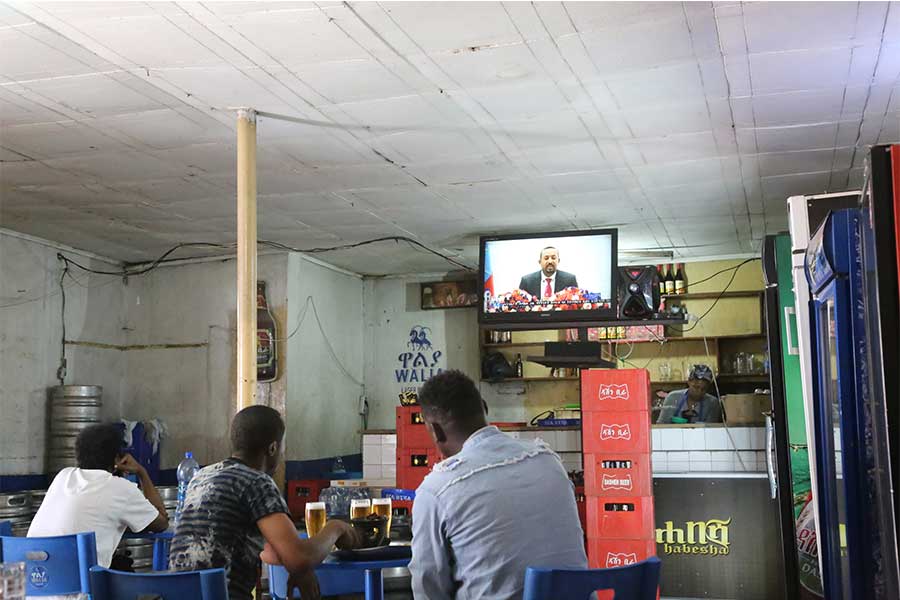
Agenda | Jun 21,2025
Among Portugal’s few literary giants, Alberto Caeiro, Álvaro de Campos, Ricardo Reisall and Fernando Pessoa are mentioned. Yet, all the preceding three were pseudonyms of the last one. As if these are not three too many, he created some seventy-five others. These dreamed-up personalities of one of the 20th century’s greatest poets in the Portuguese language, every so often, were used to hold unpopular or extreme views.
Pessoa insists that he used pseudonyms to express himself fully in a different style. It could also be just that he wanted to say things that he did not wish to under his name. The anecdote raises a serious question today. All of us have become private broadcasters, able to make up a persona at will and “share” about some truly unpopular or even dangerous things that could have consequences in the real world. It is all thanks to social media.
It is not just the unsightly things on digital social platforms but even the accolades, which can turn us into attention-seeking hedonists. In an interview, Jack Dorsey of Twitter once said that if he is allowed to undo a feature from his brainchild, it is his regrettable “like’’ button. It is reminiscent of the Athenian lawmaker Draco, a devoted theatregoer, who received too much applause, and died from it as a result. While he was sitting in a theatre, other spectators hailed him by clapping wildly and throwing their cloaks and caps in tribute, despite his passing of many harsh laws – a track record that gave us the word “draconian.” So many garments landed on him that he was enveloped and smothered to death. Of course, like most historical accounts from millennia ago, this should be taken with a grain of salt.
There is little to be impressed about when it comes to exploiting media spaces for personal or political gain. The public media has long been accused of being pro-government while the age of social media, where every citizen can be a publisher, inaugurated social division. But here and there, as inspiration, are a few that have been iron-willed, who brought their broadcasters, or programme genres to a reputed position. They engaged their audiences without using pseudonyms or engaging in sensationalist material designed to capture attention but not engage intelligently.
A week ago, the Ethiopian Broadcasting Agency staged a meeting of players in the media industry with the hope that veterans share their experiences and careers. I wished it was broadcasted live to assess their views, see how it fits as the industry struggles to stay on track in the age of yellow journalism and short attention spans. It is important for media players of today to hear from the likes of Meaza Birru, whose name brings to mind interviews, having sat down the movers and shakers of many in a position to impact our lives; or the quick-witted Abaynesh Birru; and print media’s household name, Maeregu Bezabih.
The media consumption of a while ago was different, no doubt. Audiences did not have a seemingly unending amount of content to choose from, but a limited few. I reminisced with a friend recently about how he used to record his favourite Saturday afternoon radio programmes with a cassette tape recorder – the latest technology for us at the time – to give it an audience again on midweek. He liked to boast that he had two Saturdays within a week.
I remember how entertaining things used to be merely because they were scarce, though most of the content in what is now known as legacy media was not at all that great. We used to chase Sunday morning papers and go to great lengths to either record or catch our favourite programmes on the radio. We craved new books, though almost all of them were fiction, and read them economically not to finish them at once – to bear and enjoy the suspense longer.
Hopefully, the stories of media consumed and the content produced help furbish today’s output. The only things that carry over should not be the pseudonymous turns of the Portuguese Pessoa but lessons legacy media has on the standards of journalism, including the responsibility of each to the audience. The professionalism in the field was not as up to par as hoped and content was limited, but the content producers of yesterday were not mere attention seekers. Most importantly, they had far greater respect for the intelligence of their audience.
PUBLISHED ON
Jul 10,2021 [ VOL
22 , NO
1106]


Agenda | Jun 21,2025

Editorial | Jul 10,2020

Agenda | Aug 10,2019

Viewpoints | Jan 21,2023

Radar | Dec 07,2019

Viewpoints | Mar 20,2021

Exclusive Interviews | Apr 19,2025

In-Picture | Apr 13,2025

News Analysis | Jan 05,2020

My Opinion | Jan 31,2021

Dec 22 , 2024 . By TIZITA SHEWAFERAW
Charged with transforming colossal state-owned enterprises into modern and competitiv...

Aug 18 , 2024 . By AKSAH ITALO
Although predictable Yonas Zerihun's job in the ride-hailing service is not immune to...

Jul 28 , 2024 . By TIZITA SHEWAFERAW
Unhabitual, perhaps too many, Samuel Gebreyohannes, 38, used to occasionally enjoy a couple of beers at breakfast. However, he recently swit...

Jul 13 , 2024 . By AKSAH ITALO
Investors who rely on tractors, trucks, and field vehicles for commuting, transporting commodities, and f...

Nov 1 , 2025
The National Bank of Ethiopia (NBE) issued a statement two weeks ago that appeared to...

Oct 25 , 2025
The regulatory machinery is on overdrive. In only two years, no fewer than 35 new pro...

Oct 18 , 2025
The political establishment, notably the ruling party and its top brass, has become p...

Oct 11 , 2025
Ladislas Farago, a roving Associated Press (AP) correspondent, arrived in Ethiopia in...